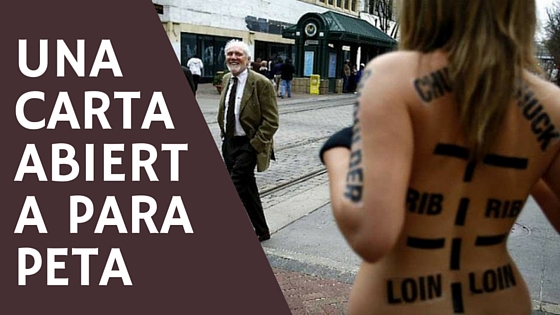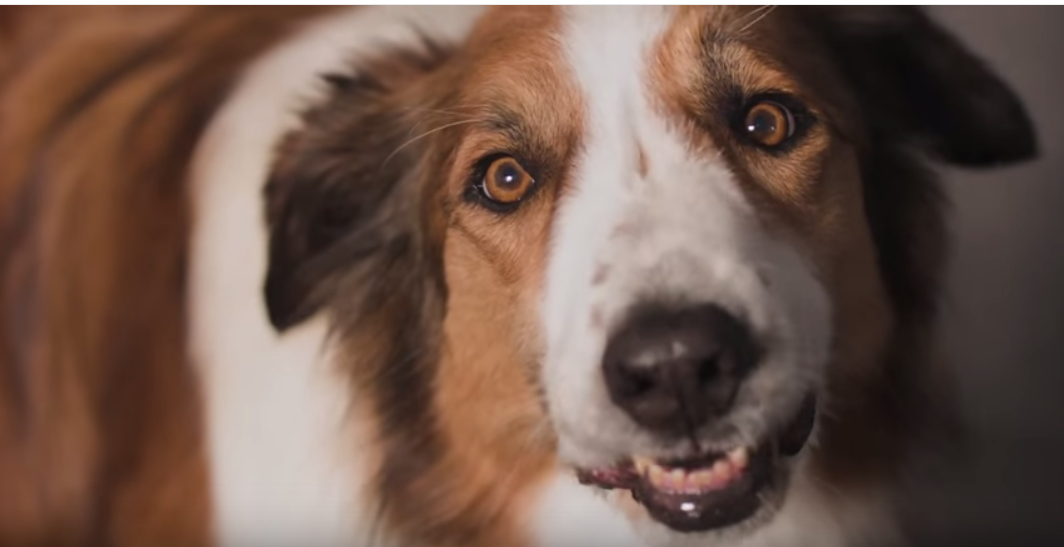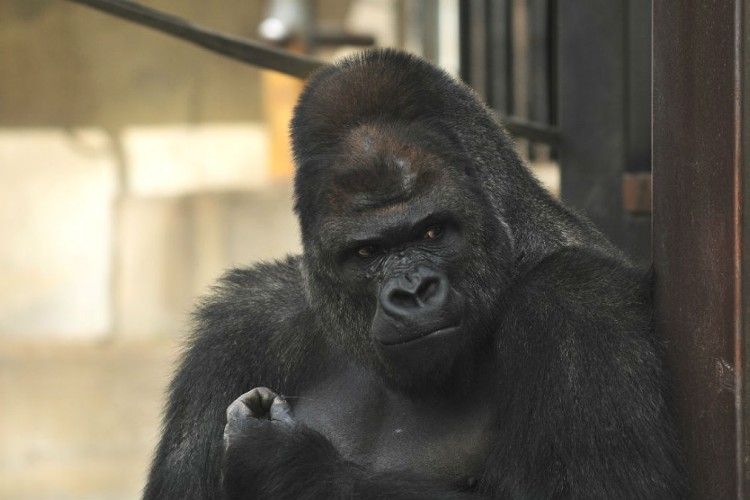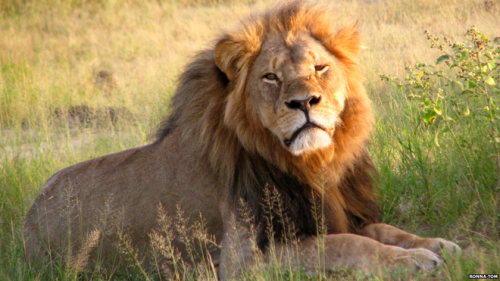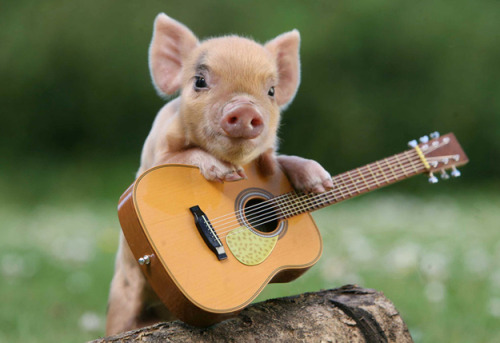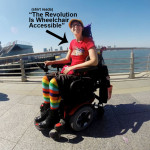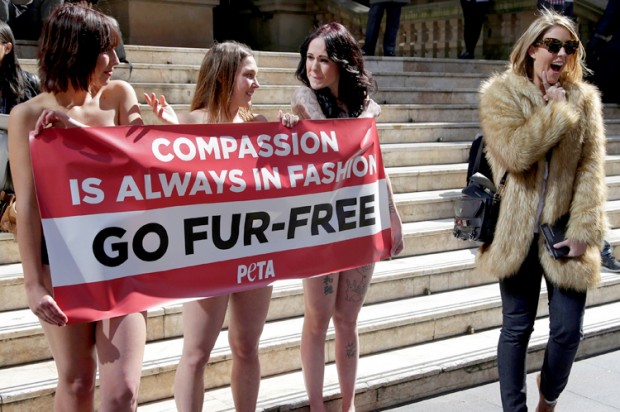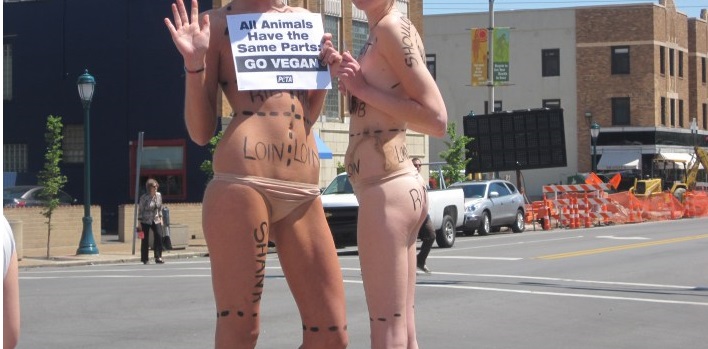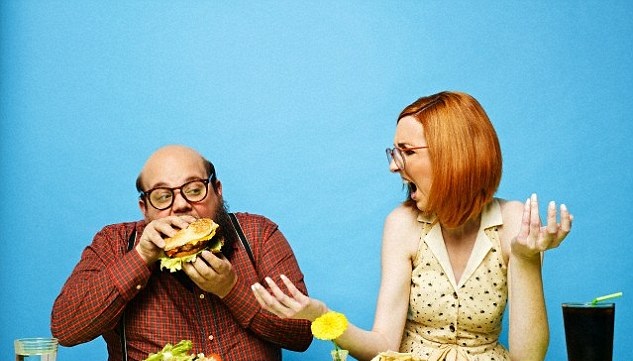
| Translation by Eszter Kalóczkai. See more Hungarian translations of intersectional vegan essays by visiting their blog, Tudatos Vegán. The original English version of this essay can be found by clicking here. |
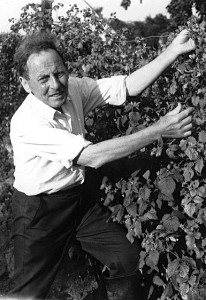
Donald Watson. Image from The Vegan Society
írta: Dr. C. Michele Martindill
“Mit tenne Donald Watson?” – hogyan erősíti ez a kérdés a szexizmust és hogyan akadályozza az inkluzivitást a vegán abolicionista mozgalomban?
Micsoda szentségtörés! Hogyan mondhat bármelyik vegán bármi negatívumot arról a férfiról, aki kitalálta a “vegán” szót! Olvasd el a címet újból: nem Donald Watson a probléma, és nem is az állatok szenvedésének a felszámolásáért végzett munkája. Az a problémás, ahogyan a mai vegánok mindig Watson nevét és az ő veganizmus-deinícióját hívják segítségül, mint egy csodaszert, akárhányszor vita keletkezik a mozgalmon belül, ahelyett, hogy a kritikus és reflexív gondolkodás segítségével vizsgálnák, hogy miért botladozik a mozgalom.
Ha valaki megérdezi, hogy a vegán mozgalom miért áll szinte kizárólag nőkből, de a vezetői miért szinte kizárólag férfiak, akik patriarchális értékeket hangoztatnak, arra az a válasz, hogy azért, mert a veganizmus az állatok segítéséről szól. Ha felmerül a kérdés, hogy egy vegán csoport logójáról miért üvölt a korizmus, akkor az a megjegyzés lesz a válasz, hogy az állatokra kell koncentrálnunk, nem a korizmuson fennakadni, valamint, hogy az idős férfit és nőt ábrázoló karikatúra csak egy vicc. Ha valaki azt kérdezi, hogy színes bőrű emberek miért nem képviseltetik magukat a vegán mozgalomban, az lesz a válasz, hogy lehetnének vegánok, de egyszerűen nem akarnak azok lenni.
Minden esetben előkerül az emlékeztető, hogy a vegánság az állatokról szól, és persze idézik Donald Watsont és az ő veganizmus-definícióját, hogy véget vessenek a társalgásnak. Azok a vegánok, akik a veganizmust eszerint a nagyon szűk definíció szerint értelmezik, akár azt is kérdezhetnék: “Mit tenne Donald Watson?” (MTDW?) – a népszerű “Mit tenne Jézus?” mondás alapján. Minde esetben, amikor a mozgalom kirekeszti a nőket, az idősebb embereket, színes bőrű embereket, a szegényebb, vagy fogyatékossággal élő embereket: MTDW? Eközben a peremre szorult csoportok tagjai azon gondolkoznak, hogy hogyan tudja minden elnyomásnak és kihasználásnak véget vetni egy olyan fehér férfi, aki a fehér felsőbbrendűség, patriarchátus, gyarmatosító és birodalomépítő ideológiák korában élt?
A legtöbb vegán pontosan tudja, hogy Donald Watson 1944-ben találta ki a “vegán” szót mind arra, hogy különválassza a korábbi vegetárianus életmódjától azt az új szemléletet, hogy az embereknek hogyan kellene a környezetükhöz viszonyulniuk, és, hogy a hozzá hasonló gondolkodásúakat összefogja egy egyesületbe – így született a Vegan Society (Vegán Egyesület). Sokan kívülről tudják Watson veganizmus-definícióját:
[…] egy olyan filozófia, ami – amennyire lehetséges – elkerüli az állatok mindennemű kihasználását, és az ellenük irányuló kegyetlenséget, történjen az étel, ruházkodás, vagy bármilyen egyéb célból; és ennek következtében állathasználat-mentes alternatívák használatát és fejlesztését segíti, hogy az mind az emberek, mind az állatok, mind a környezet javára váljon. Az étrend terén ez azt jelenti, hogy el kell hagyni minden olyan terméket, ami részben vagy egészben állítoktól származik.
– The Vegan Society
Ez egy eléggé radikális álláspont volt 1944-ben, ahogy ma is az, úgyhogy Donald Watson biztosan radikális volt a maga idejében… ugye?
Egy jelenlegi vezető az abolicionista vegán mozgalomban vitatja, hogy Watson definíciója arra inspirálná a vegánokat, hogy dologozzanak a társadalmi igazságért az emberekért is, és nem-emberi állatokért is, de azt is hozzáteszi, hogy a radikális veganizmus évtizedek óta halott, mert most már csak a konzumerizmus, egy fogyasztói szemlélet maradt meg belőle. Ez a vezető egyéniség azt kérdezi, hogy hogy lehet, hogy a vegánokat jobban érdekli egy új állati termék-mentes csokoládészelet megjelenése, mint az, hogy a Vegan Society és más csoportok profitorientált vállalkozássá válik, miközben mindenkinél több adományt kap, amit aztán a magasan fizetett vezetői kapnak. Hogyan kebelezte be a veganizmust a kapitalizmus? Itt egy jobb kérdés: Vajon mennire lehet radikális Donald Watson és az ő veganizmus-koncepciója, amikor egy olyan társadalomból származik, amit átitat a fehér felsőbbrendűség, a patriarchátus, a gyarmatosítási politika és az imperializmus? Megjegyezzük, hogy ez a kérdés nem Watson személye ellen irányul, hanem azt hivatott megmutatni, hogy a rendszerszintű elnyomások hogyan befolyásolják a társadalmi aktivizmust, ezáltal az alaápítása körülményei sebezhetővé teszik a mozgalmat. Ez az esszé nem kívánja Donald Watson személyét támadni.
A “radikális” egy társadalmilag konstruált fogalom, ami azt jelenti, hogy a “radikális” definíciója aszerint a történeti és helyi kontextus szerint változik, amelyben a szó előfordul. Donald Watson társadalmában, az 1944-es Angliában bizonyára radikálisnak számított, hogy nem eszik húst és semmilyen más állati eredetű terméket nem használ. De egyes vegánok nagy bánatára, 2015-ben nincs semmilyen kijelentés Donald Watsontól, amit a mi korunkban a többi társadalmi igazságon belüli kérdésre lehetne alkalmazni. Megkérdezhetjük, hogy MTDW? a szexizmussal, rasszizmussal, akadályozottság, osztály vagy kor alapján történő megkülönböztetéssel, de nincs végleges válasza azon vegánok számára, akik a perifériára szorult csoportok tagjait is bevonni az abolicionista vegán mozgalomba – és ezek az erőfeszítések felismerik, hogy az emberek nemi, etnikai, akadályozottségbeli, osztálybeli és korbeli identitásának a kereszteződését (interszekcióját) a különböző csoportokon belül.
Sose fogjuk tudni, mi volt Watson szándéka. Ahhoz, hogy ismerjük valaki szándékait, a gondolataiban kellene olvasnunk, úgyhogy csak a történelmi kontextusra támaszkodhatunk az elemzésünkhöz. Tudjuk, hogy Watson a társadalomban betöltött pozíciója segítségével tudta megalapítani a Vegan Society-t, egy olyan társadalomban, ami tisztelte a Watsonhoz hasonló fehér férfiak munkáját és ötleteit. Ugyanakkor korlátozottan tudta volna népszerűsíteni az elnyomott embercsoportok számára a társadalmi igazságosságot, mert a felszólítása, hogy vessenek véget az állatok mindennemű használatának már eleve annyira radikális volt. Számtalanszor kellett már ezt elmagyaráznia, és nem nehéz elképzelni, hogy az állatok használatából meggazdagodott cégek és politikusok részéről micsoda ellenállásba ütközött. Watson radikális volt, mert megkérdőjelezte azt a közismert hitet, hogy a nem emberi állatok csak tárgyak az emberek számára, és lehet őket használni étel, tudományos kísérletek, mezőgazdasági munka, öltözködés, közlekedés és szórakozás céljából. Összefoglalva, rengeteg a megválaszolatlan kérdés: hogyhogy a mai abolicionista vegán mozgalom legfőképpen fehér, még mindig a patriarchátus értékei szerint működik, és vajmi kevéssé próbál befogadó lenni.
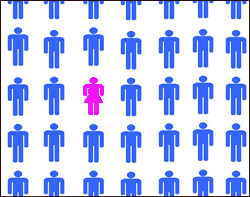
Nemrég egy internetes vita rámutatott, hogy mennyire nehéz Watsonra támaszkodni, hogy ő döntse el, hogy hogyan lehet befogadóbb a vegán mozgalom. Amikor egy csoport tagjait kérdőre vonták a mozgalmon belüli szexizmussal kapcsolatban, akkor egy férfi azzal válaszolt, hogy a strukturális szexizmus mindig is létezett, úgyhogy nem kellene miatta aggódni. Ez a hozzászóló attól tartott, hogy valaki szerint Donald Watson nem volt radikális, hanem a fehér felsőbbrendű társadalom egy terméke. Inkább védett meg egy vélt sértéstől egy fehér férfit, mint, hogy komolyan vegye a mozgalmon belüli szexizmust. Egy másik férfi hozzászóló kijelentette, hogy rengeteg nő vett részt a mozgalomban, és annak vezetőségében, és nekiállt a számoljunk vaginákat (1) játéknak, felsorolva az összes híres női vegánt. Arra is kitért, hogy Watson felesége is részt vett a “vegán” szó feltalálásában, minden bizonnyal a konyhaasztalnál. Mások azt felelték, hogy az Egyesült Államokon kívüli országokban rengeteg női vezetp van a vegán mozgalomban, akik nem “férféiként gondolkoznak”, ezzel azt bizonygatva, hogy a szexizmus csak egyes földrajzo területeken érvényesül, és nem létezik például az Egyesült Királyságban Új-Zélandon vagy Ausztráliában. Mindezek a válaszok semmibe veszik a lényeges mondanivalót: nem számít, hány női vezető vagy szervező van a vegán mozgalomban addig, amíg egy olyan társadalomban élünk, amiben a fehér férfiak ideológiái, társadalmi struktúrái és mozgalmi stratégiái érvényesülnek.
Amikor az abolicionista vegán mozgalomnak leginkább foglalkoznia kéne a befogadással/inkluzivitással, a tagadás és védekező pózolás mocskába ragad. Amíg a férfiak gyorsan rávágják, hogy #nemmindenférfi (#notallmen – McKinney, 2014), ha bárki felhozza a szexizmus problémáját, mintha csak egyes rosszindulatú egyének hibája lenne a szexzmus, azonban annak a rendszerszintű lebontását továbbra is elfojtják. A vállalati szemlélet és a kapitalizmus él is virul az úgynevezett vegán társaságokban és egyesületekben, mert nem ismerjük el, hogy az abolicionista vegán mozgalom gyökerei a férfiak által irányított fehér felsőőbbrendű társadalomból nőttek ki.
Semelyikőnk sem szállhat szembe ezekkel a társadalmi struktúrákkal, csak a puszta létezésük elleni küzdelem által. A nőket nem fojtja le egészen a patriarchális társadalmi rend, de mindenképp tudatosítaniuk kell magukban, hogy hogyan működik ez a berendezkedés, és milyen hatással van minden nőre, hogy aztán aktívan lebonthassák ezeket, és a helyükre egyenlőségen, együttérzésen és békességen alapuló struktúrák kerüljenek.
De mi lesz a férfiakkal?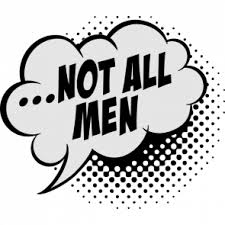
Az abolicionista vegán mozgalomban azt mondani a nőknek, hogy ne panaszkodjanak a szexizmus miatt nem más, mint a férfiak hatalmi pozícióját védeni. Felsorolni, hogy hány meg hány női vezető van a mozgalmon belül, és, hogy a mozgalom tagjainak a tübbsége nő nem más, mint figyelemelterelés arról, hogy a férfiak hogyan tartják meg a helyzetüket és a privilégiumukat. Azt mondani a nőknek, hogy foglalkozzanak inkább az állatokkal és ne rontsák a mozgalom hírnevét egy másik módszer arra, hogy a férfiak hatalmi helyzetét állandósítsák. A férfiak akár azt is mondhatnák, hogy nem akarnak a nemek közötti egyenlőtlenségekről beszélni, és inkább megmondanák a nőknek, hogy hogyan szolgálhatnák legjobban a férfiak érdekeit. A férfiak folyamatosan félbeszakítják a nőket, mind az interneten, mind személyesen, és kérdésekkel bombázzák őket, olyan kérdésekkel, amelyek mikroaggressziónak számítanak (Khan, 2015).
Példák a mikroaggresszív kérdésekre:
- Hogyan mondhatod, hogy a szexizmus probléma a mozgalomban, ha Donald Watson munkájába is besegített a felesége? (megjegyzés: mindig Donald Watson munkásságáról van szó, nem a feleségééről)
- Hogyan mondhatod, hogy a szexizmus probléma a mozgalomban, ha az 1980as években rengeteg nő szervezett állatmentő akciókat, és ez a mai napig így történik?
- Hogyan mondhatod, hogy a szexizmus probléma a mozgalomban, amikor elsősorban a vegűnság terjesztésével kellene foglalkoznunk, főként mivel a vegánság a szexizmus végét fogja jelenteni?
- Hogyan mondhatod, hogy a szexizmus probléma a mozgalomban, amikor te magad vagy szexista? Azt se tudod, mit jelent a szexizmus. Én tudom, mit jelent, te a közelében sem jársz. Szexista dolog engem szexistának hívni.
ÉS MÉGVALAMI:
A férfiaknak az elnyomott társadalmi csoportok helyzetébe kellene képzelniük magukat, és átgondolni, hogy vajon hogyan hangozhat, ha egy fehér férfi egy másik fehér férfit – Donald Watsont – idéz, amikor a vegánságot definiálja. Hallanunk kellene mozgalmon belüli nők hangját, de ne csak nőket idézz nőknek – lépj oldalra és hagyd, hogy a nők magukért beszéljenek. Ez a radikális.
Idézetek:
Khan, A. (2015, January 18). 6 Ways to Respond to Sexist Microaggressions in Everyday Conversations. Retrieved from Everyday Feminism:http://everydayfeminism.com/2015/01/responses-to-sexist-microaggressions/
McKinney, K. (2014, May 15). Here’s why women have turned the “not all men” objection into a meme. Retrieved from Vox: http://www.vox.com/2014/5/15/5720332/heres-why-women-have-turned-the-not-all-men-objection-into-a-meme
Megjegyzések
1. Ezt inkább szólásnak szánta a szerző, és nem azt akarja mondani, hogy minden nőnek vaginája van. A mozgalmon belüli fehér férfiak még mindig nem ismerik el a transz vagy egyéb gendereket, nemi identitásokat, még mindig binárisan képzelik el a világot. Ha netánkettőnél több gendert ismernek el, akkor is csak a vaginákat akarják számolni a mozgalmon belül.
Dr. Martindill earned her Ph.D. in sociology from the University of Missouri and taught there in the Sociology Department, the Peace Studies Program and the Women’s and Gender Studies Department. Her areas of emphasis include political sociology, organizations and work, and social inequalities. Dr. Martindill’s dissertation focuses on the no-kill shelter social movement and is based on ethnographical research conducted during several years of working in an animal shelter. She is vegan, a feminist and is currently interested in the stories women tell through their needlework, including crochet, counted cross stitch and quilting. It is important to note that Dr. Martindill consistently uses her academic title in order to inspire women and members of other marginalized groups to pursue their dreams no matter what challenges those dreams may entail, and certainly one of her goals is to see more women in academia.

